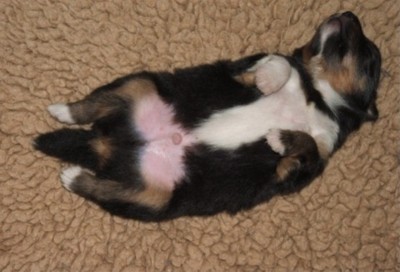
| Home | |
| Activities | |
| Your pictures | |
| Your hearth-warming | |
| Rescue | |
| Our breeders | |
| Links |
 |
The puppy grows up ...
 |
But before doing so he will have to spend the first few weeks of his life living in the best possible conditions. Indeed, the first eight weeks will determine the type of adult he will later become.
During the first two weeks he can't see or hear anything. He can only smell and push around with his nose in order to find his mother's nourishing nipples. His back legs have very little strength, but he can already use his front legs for crawling and pushing. He cuddles up to his brothers and sisters for warmth, and then in a few days he begins to shiver and control his own body temperature. During these first two weeks the fragile babies need warmth and quiet so that their mother will stay calmly with them. Besides, a good mother won't be happy to leave them for long...
Then the world seems to explode, their eyes and ears open up and they discover new sensations. The growls and other sounds of their mother at first, then little by little their senses become sharper and they open up to the outside world. At the same time their bodies become easier to control , they begin to learn to walk and explore outside of the 'nest'. During the third and fourth weeks the puppies need to experience the factors which will control their metabolism, the light of day and darkness of night, they need the contact with their siblings to begin to play and be sociable, then, later, the contact with adults other than their mother. Little by little we can also accustom them to the sounds of 'human' life like music, television (for those who watch it...), the vacuum cleaner, the draught when a door is opened...
From the fourth/ fifth week, the puppy learns social codes (with his brothers and sisters, his mother, other adults), he discovers species other then his own (different humans, men, women, children, cats, birds, rodents... and many others...). He will begin to learn to manage his need to explore with his natural fears which also develop gradually. Everything they experience during this period and the immediate following weeks will be considered to be normal for them later on. Anything which they have not experienced during these few weeks may later be considered to be a threat or something fearsome because it was not experienced during the early months of the puppy. During this period the young dog needs to experience as many different stimuli as possible and above all contact with people.
Finally, after the first two or three weeks of safety and warmth, the puppy needs to live within the human home in order to become a well-balanced companion. He also needs to experience the car, the sounds of the city, the smells at the vet's and handling. Everything must be gently introduced of course, while respecting the rules of hygiene and asepsis to protect the puppy from any illnesses. He needs to know what it's like to go through a doorway (don't laugh, I know a dog who took months to go through one by himself, and at over a year old he still needs time to be able to go into a place he doesn't know), what a staircase is like (even if we must take care not to leave him alone as the steps are too high for his fragile joints) …
Of course, it would be practically impossible for we breeders to live 100% of the time with the puppies born at our place, they are 'invasive' when awake, and tend to chew everything they can get their teeth into. However, it is essential that the puppies get the chance to enter the home as much as possible, and above all spend as much time as possible with bipeds of all ages and both sexes.
In order to live in harmony with people, as an adult later on, he needs to experience life within a home during these first few weeks which are so important. After all 'domestic' means ' one who lives in the human home'. It is therefore the breeder's responsibility to do his best, according to his available means, to allow the puppies which leave his home do him credit. It is also important for the future 'master' to provide the right living conditions for his dog which he will be adopting for the next 15 years (or more if possible).
Christine COL
Translation by Helen COL